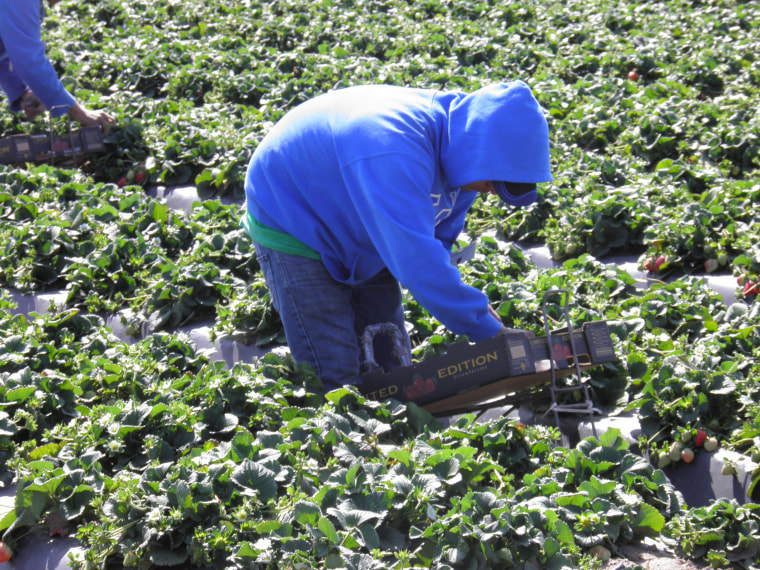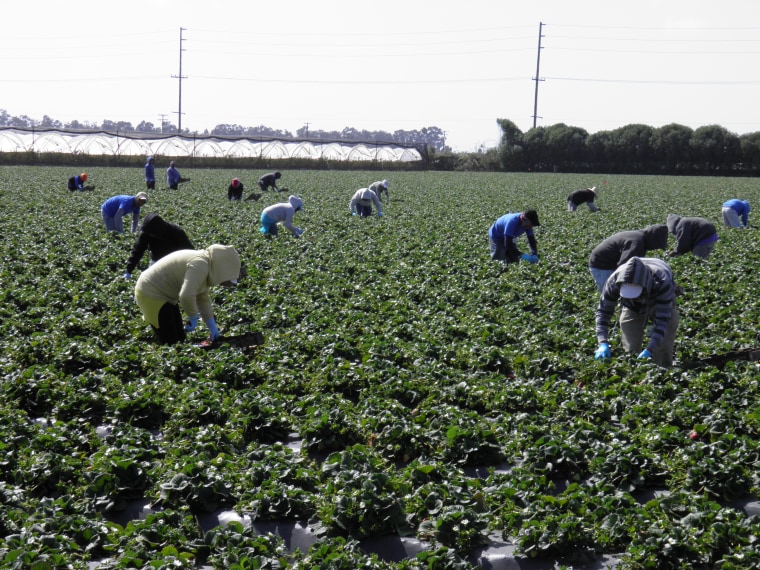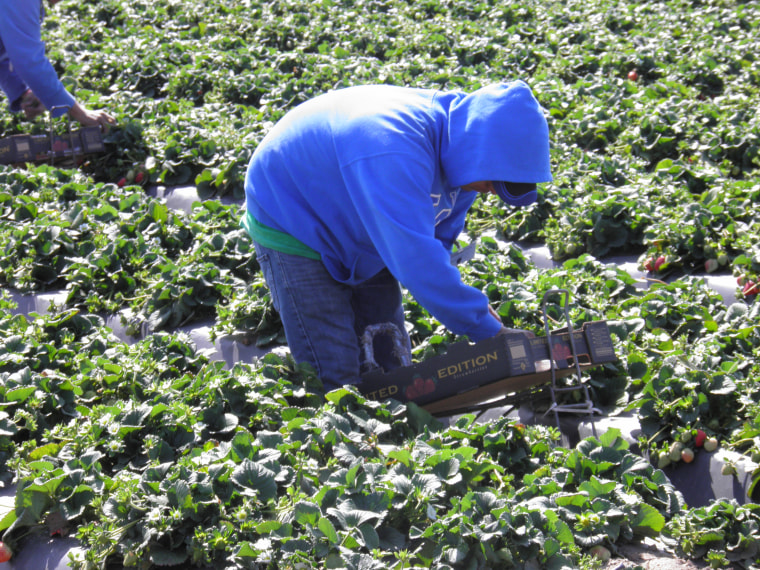
The recent outbreak of parasite-borne food poisoning traced to salad greens has renewed focus on farm safety. But instead of waiting for more government action to stop contaminated produce from reaching your table, consumer advocates have formed a unique coalition with retailers, farmers, suppliers and farm workers to promote food safety and improve working conditions in the produce industry.
The Equitable Food Initiative (EFI), spearheaded by Oxfam America, provides special training to farm workers on hygiene, clean water and more.
“It’s an interesting concept,” said Peter O’Driscoll, EFI’s project director. “How do you get farm workers to be part of the solution to challenges in the produce industry, particularly around food safety, pesticide use, worker safety and wages?”
The initiative has been in the works for about five years. The pilot project started in California last year and the first crops harvested this way – strawberries – have been sold at some Costco stores under the “Limited Edition” brand name since April of 2012. Costco supports EFI and is currently the only retailer selling these berries.
“I think the Equitable Food Initiative is spectacular,” said Bill Marler, a Seattle attorney who specializes in food safety lawsuits. “Working with the people who are producing our food is one piece of the puzzle that not many businesses do. And that’s the great thing about this.”
These Limited Edition strawberries sold at Costco come from California’s Andrew and Williamson, a major producer of berries, tomatoes and cucumbers. A&W is the first grower to take part in the EFI program.
Through the Equitable Food Initiative, a core team of about a dozen A&W workers representing pickers, sprayers, drivers, supervisors and farm management received 40 hours of training. Among other things, they learned about proper hygiene and sanitation, clean water, and proper pesticide use. These “team leaders” then shared this information with their peers.
Ernie Farley, a partner at A&W, said that for this program to be successful, everyone must understand the rules and the goals: food safety, better working conditions, respecting workers and empowering them to challenge improper practices or procedures.
“These are ground-breaking, culture-changing things that we’re talking about,” Farley told me. “No farmer or farm worker wants to harvest any food that isn't healthy, but the current system generally rewards speed and volume.”
Farm workers are told that if they see a safety issue in the field – what are called “red button moments” – they are expected to say something about it to their supervisor. They are also constantly reassured that they will not be penalized for speaking up.
“The degree to which farm workers can be trained and supported to identify risks to food safety will directly benefit consumers,” said Erik Nicholson, a vice president with the United Farm Workers Union and co-chair of EFI. The UFW is a founding member of the initiative.

Nicholson said that at a typical farm, if the harvesting crew sees deer droppings in the field, they would probably continue harvesting because they’re paid by the amount they pick. They also know that management would frown on leaving fruit in the field.
Under EFI, workers are trained to call a supervisor in this situation. Any berries picked in that vicinity would be destroyed and the area would be cordoned off until the deer droppings were removed and the risk of contamination was eliminated.
Will you pay more for this produce?
Not at Costco. The company pays a premium for those A&W strawberries and that “bonus” is shared with everyone on the farm, but it’s not passed along to Costco shoppers because it saves money in the long-run.
It turns out that the percentage of A&W berries that are damaged and need to be destroyed when Costco gets them is much lower than normal. And that reduced waste nearly equals the extra cost, so members don’t pay any more for these Limited Edition strawberries.
“This is a good business decision,” said Jeff Lyons, Costco’s senior vice president for fresh foods. “Food safety is critical to our members.”
High praise and some push-back
“Change takes brave people to step forward,” said A&W’s Farley. “It’s taken a lot of guts for Costco to step up and talk about this.”
But this enthusiasm is not echoed throughout the industry.
Some growers and processors don’t see the need for it. They say current government regulations are doing a good job.
Barry Bedwell, president of the California Grape and Tree Fruit League, worries about “unintended consequences” from having “too many chefs in the kitchen” – a reference to giving every worker in the field the ability to question the operation.
He’s also concerned that EFI could slow production and lead to higher costs. And he doesn't believe voluntary initiatives are the way to go.
“There’s already tremendous regulatory oversight on the farms in California and many other states,” he said. “If it’s deficient, let’s talk about that and see how we can make it better.”
Caroline Smith DeWaal, a food safety expert at the Center for Science in the Public Interest, one of the consumer groups in the EFI coalition, believes the initiative will make it easier for farmers to meet their social and food safety responsibilities.
“The federal government has good rules in place, but often they haven’t enforced them,” Smith DeWaal said. “We have a better chance of reaching the goal of a safe food supply through a program like this.”
Moving forward
Representatives from Andrew & Williamson say the company is sold on the program and hopes to expand EFI to all of its berry, tomato and cucumber crops in the U.S. and Mexico.
New farms that grow hothouse tomatoes, cherries and apples may soon join the program. And talks are underway with retailers about buying this produce.
The bottom line: No program, not even this one, can guarantee food safety. But supporters of EFI believe a new approach, starting in the fields with everyone working together toward the same goal, has the potential to make a difference.
Herb Weisbaum is The ConsumerMan. Follow him on Facebook and Twitter or visit The ConsumerMan website.
